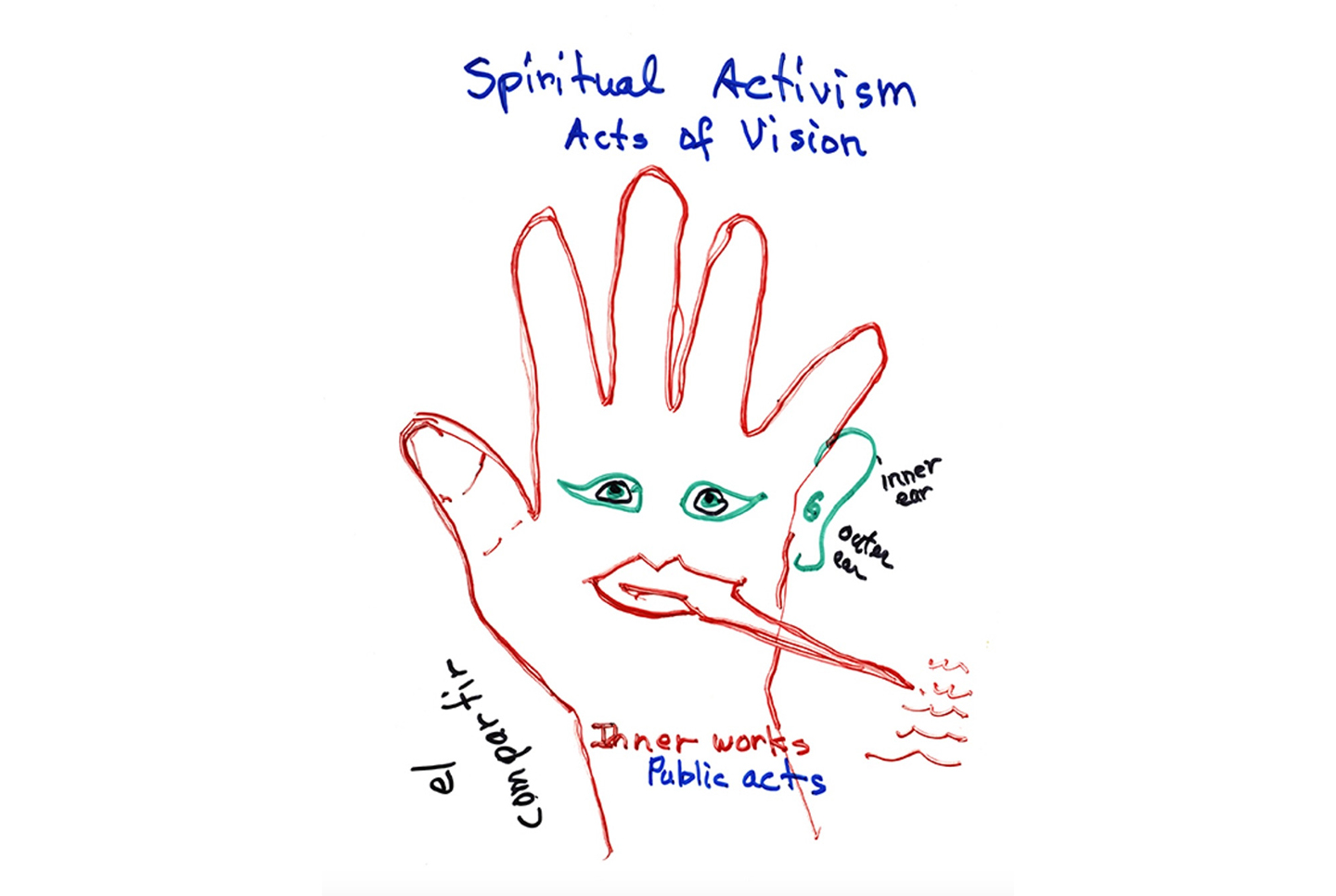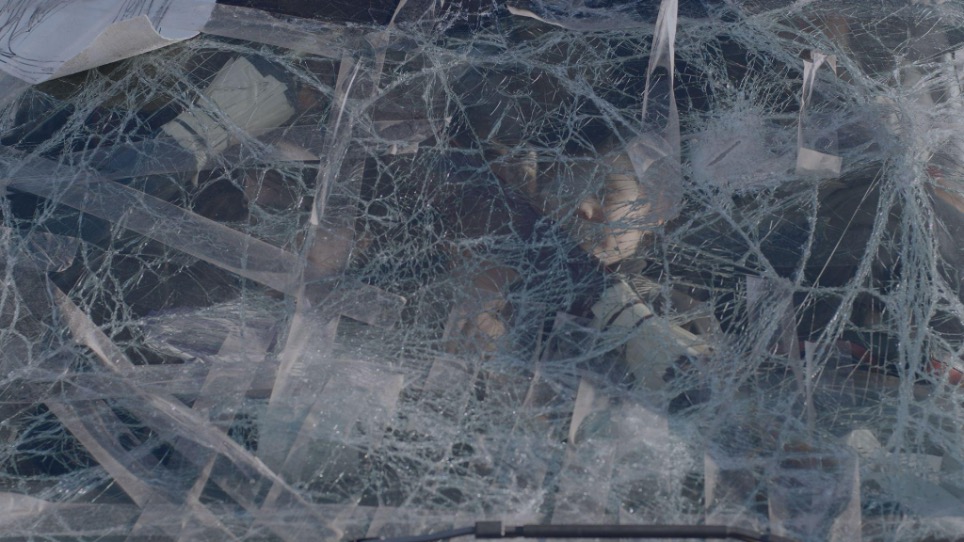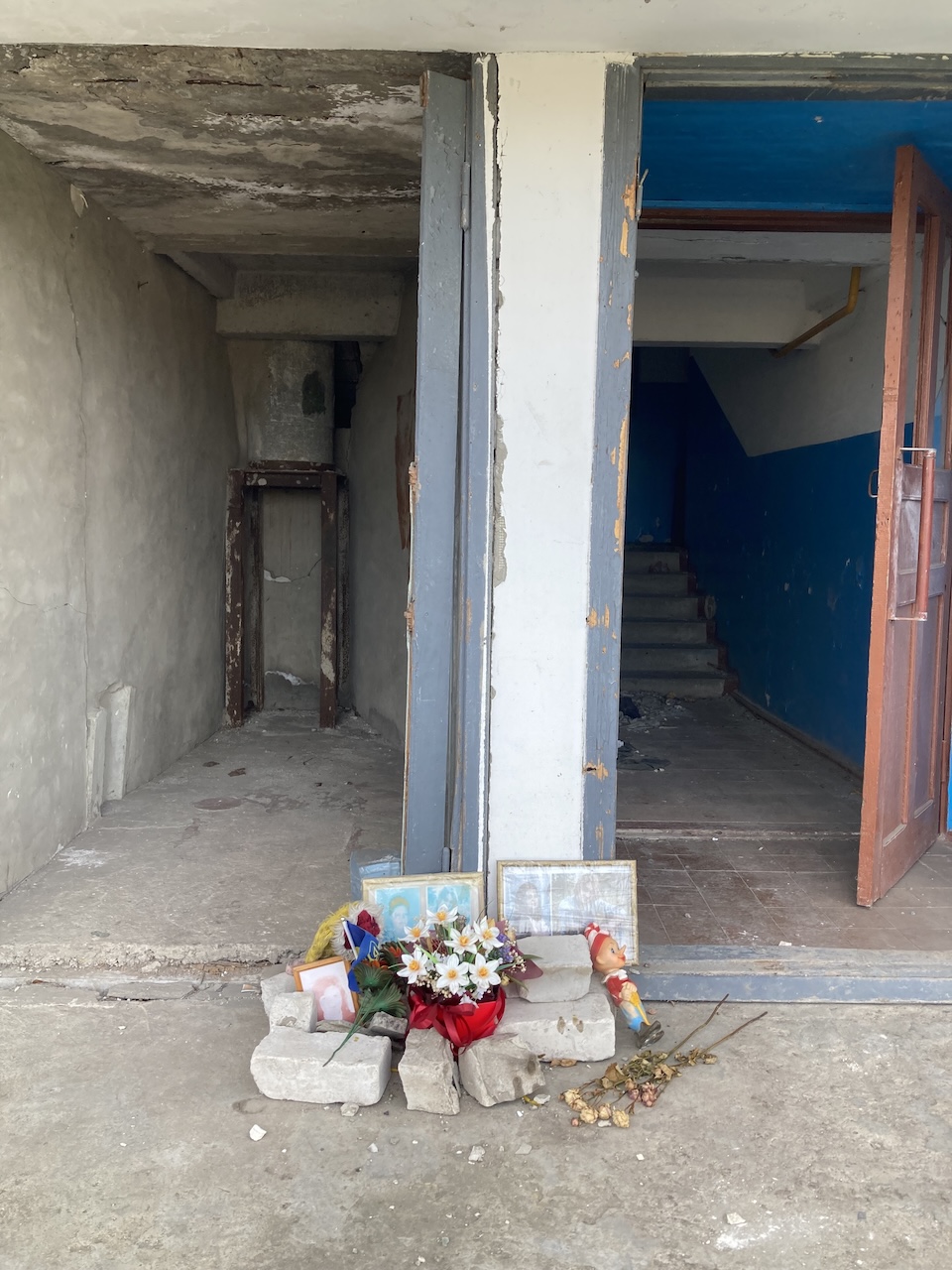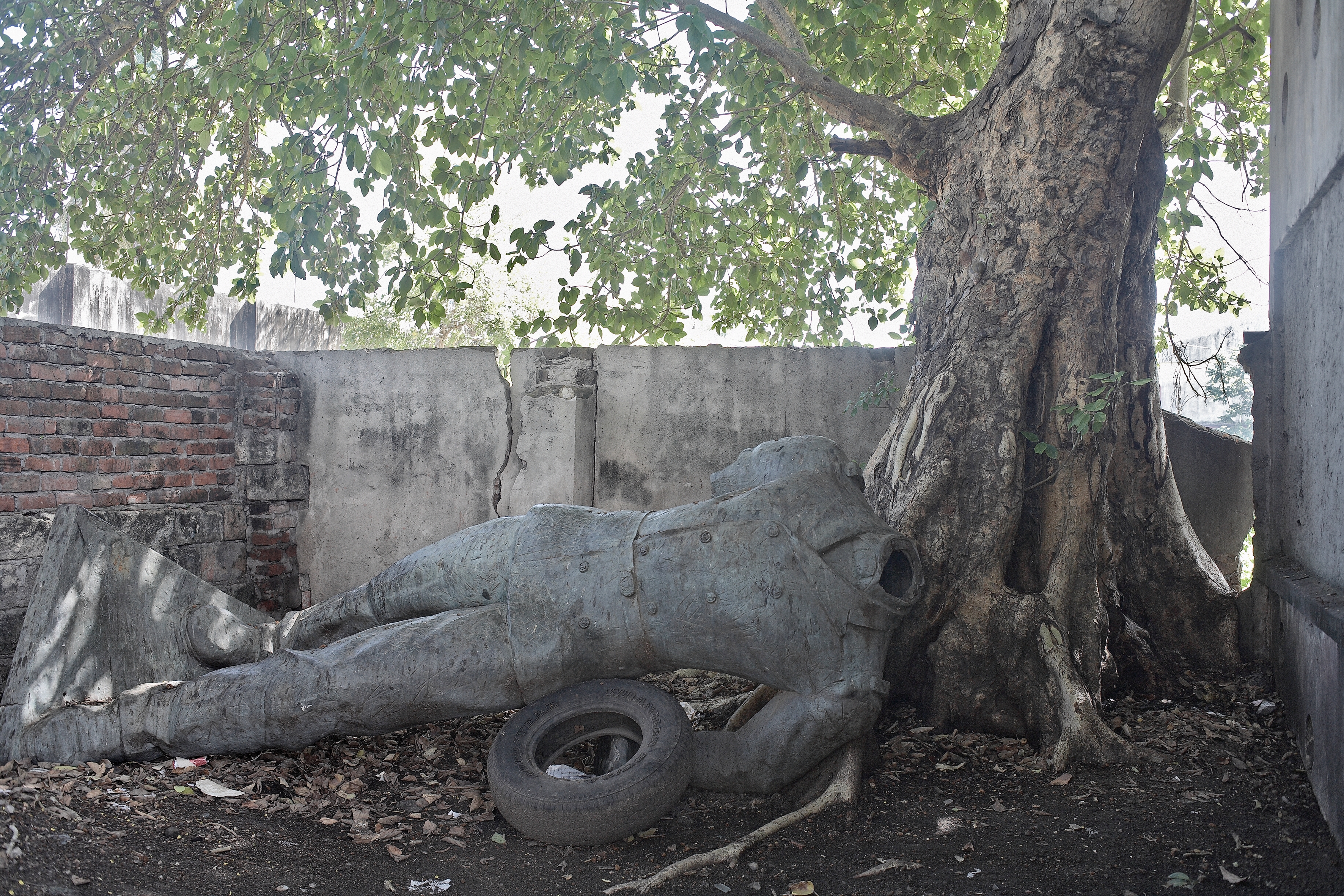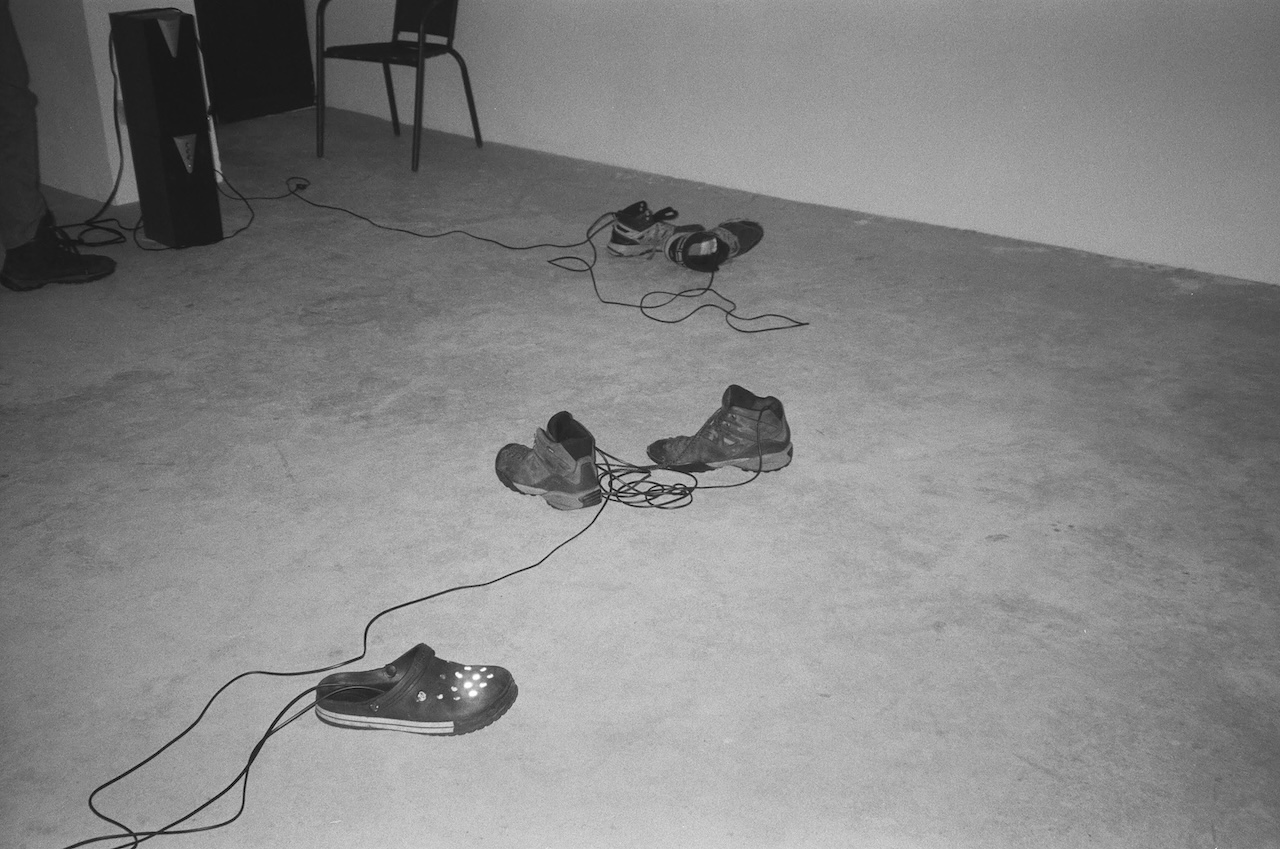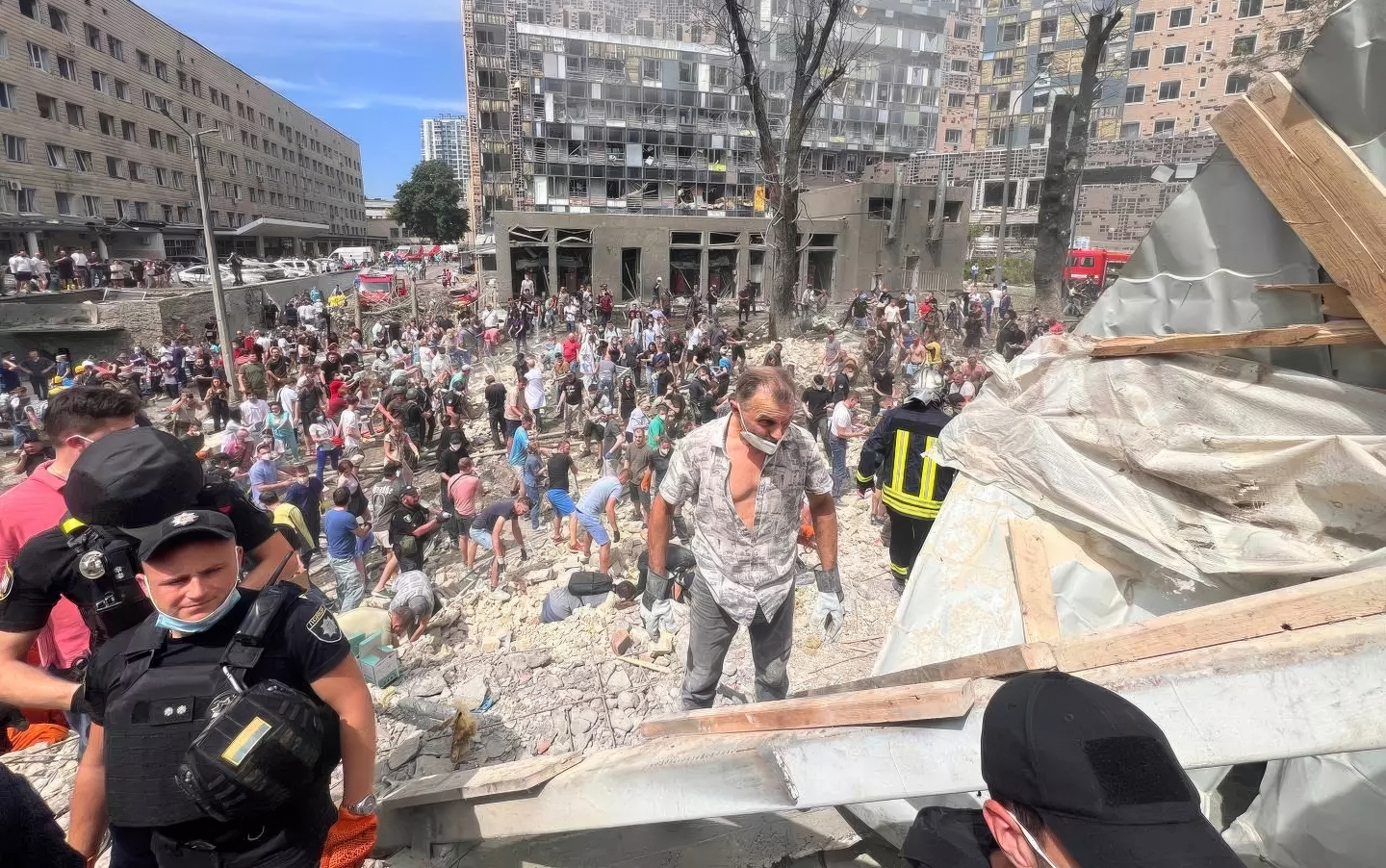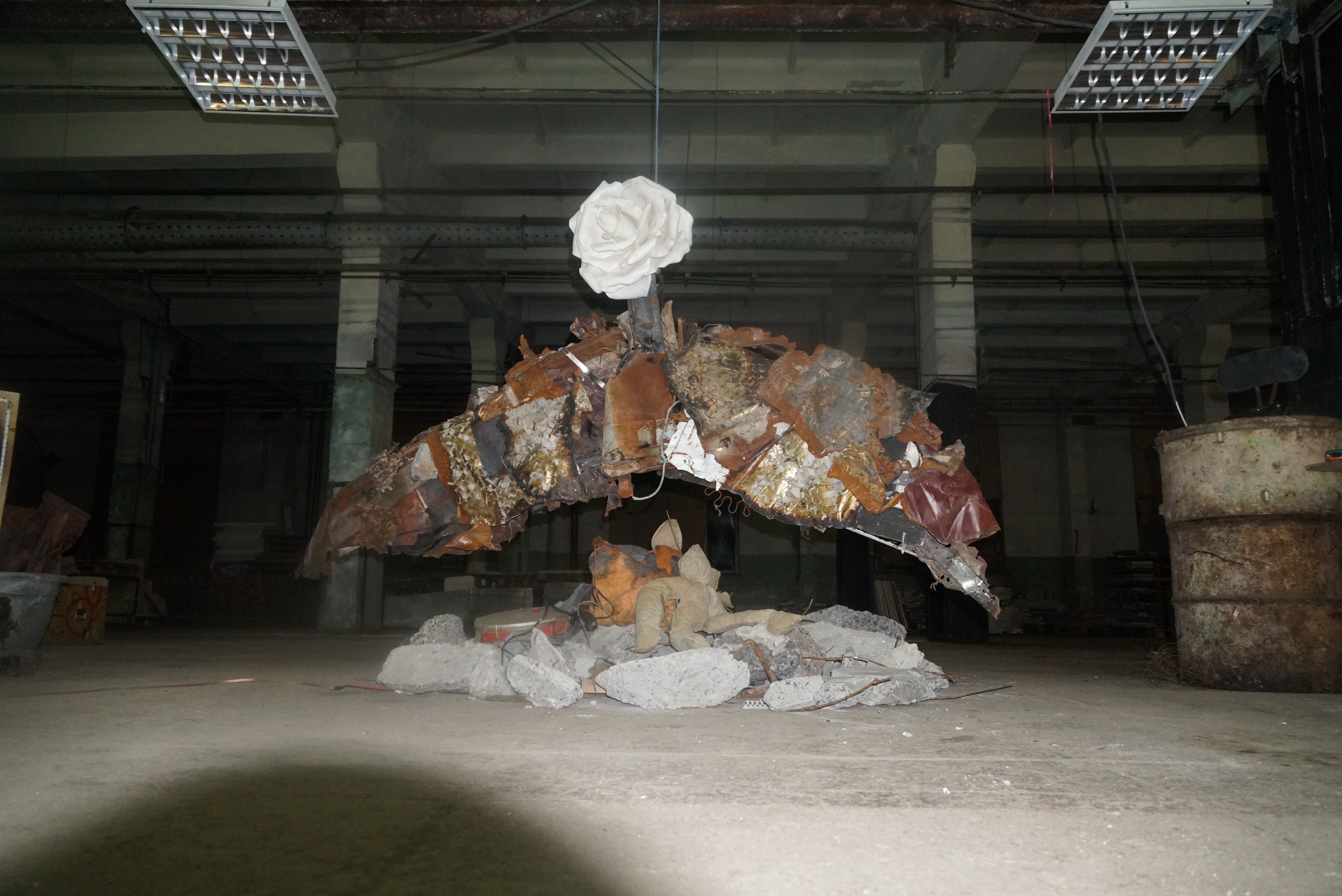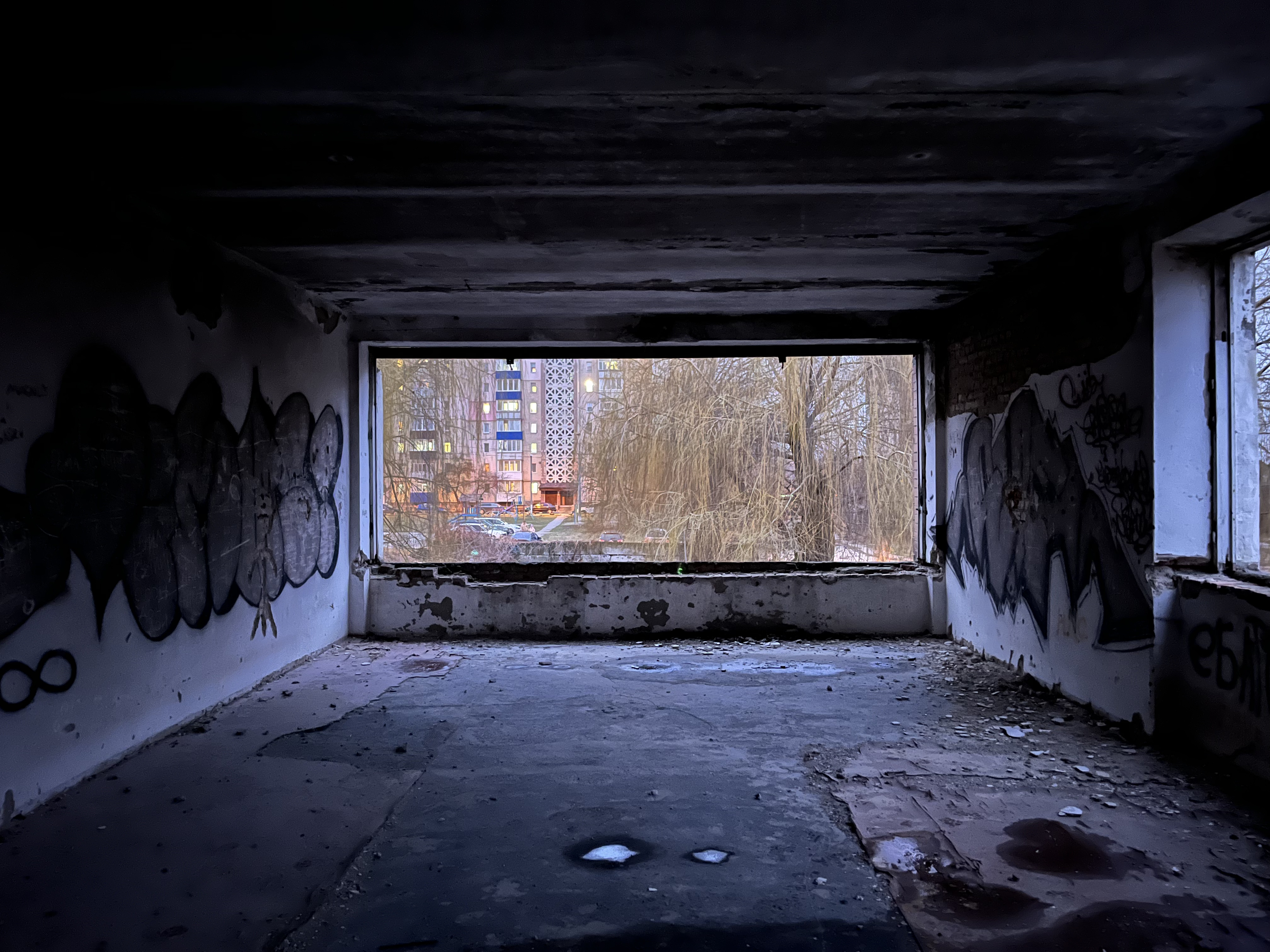
Pro-Palestinian protesters in Donostia-San Sebastián, Basque Autonomous Community, Spain.
On October 7 of last year I was watching the Ukrainian television program My Ukraina when it interrupted its “regularly scheduled programming.” Since the Russian invasion of Ukraine, every news report has begun with the latest statistics on Ukrainian deaths in the war. But suddenly these deaths receded into the background: there were reports of new deaths, a new war zone—the emerging war between Hamas and Israel. In a cruel twist, the media had exchanged deaths in one war zone for deaths in another. In just two months, the number of people killed in Palestine reached, according to official Ukrainian sources at the time, the number of civilians killed in Ukraine during the first year of the Russian invasion. But the deaths of people are not just statistics, and when it comes to the horrors of war, there are no comparisons or parallels, no matter how “rational” this may appear. Yet what disturbed me even more about those senseless statistics was the suppression of the act of witnessing. It doesn’t matter whether the suppression is conscious or a result of ignorance when it comes to conflicts that are beyond our “European” or “Western“ frame, like those currently raging in Sudan, Burkina Faso, or Ethiopia. A media or political filtering orders the hierarchy of the Western gaze and directs the rhythm of its attention.
Almost in disbelief, I stared at Volodymyr Zelensky, clad in his military uniform, as he announced that the terrorist group Hamas had attacked the Israeli population. His own political position was easy to discern, but in the early days of the war, incalculable support for Israel was the general policy of the West, so this wasn’t particularly surprising.
It was my last day in Zakarpattia, in southwest Ukraine, about three hundred kilometers south of Lviv. At the invitation of the organizers of a “Feminist Summer School” for young left-wing activists, I had given a presentation on anti-war resistance, feminism, and international solidarity based on the Yugoslav experience of the ugly nineties. About fifty young people from all over Ukraine were in the crowd, most of them women, all of them accustomed to the everyday life of war. But it hadn’t stopped them from finishing their studies, writing doctoral dissertations, teaching feminist art, starting grassroots initiatives, performing on stage … in other words, living. As we in the former Yugoslavia know, wartime survival strategies are important skills. Back then, we created micro-spaces of resistance and friendship, taught nonviolence, defied nationalist madness, and created oases of feminist support. The Ukrainian participants were not very interested in pacifism or stories of peaceful resistance, but they were interested in queer theory, feminism, and the Marxist critique of political economy. They were most interested in Yugoslavia’s central role in the Non-Aligned Movement (NAM), and the exceptional role NAM played in the global context of the Cold War. And they wanted to know about how to live in a postwar reality, whenever it does arrive. In other words, they wanted to know what we had done after the end of the war. Did we organize labor unions? Or Marxist kruzhoks (clubhouses)? What were the mechanisms of support for women who had experienced wartime violence? These were the questions the group of young Ukrainians asked as they set about to build a new political imaginary.
They seemed to be grappling with a chaotic mix of desires: a longing both for so-called Western democracy and for an anti-capitalist project grounded in economic equality. Their interest in the West—or at least in the almost naive projection of an imagined future of Western “well-being”—gave me a sense of the aporia that these young Ukrainians were confronting. Out of this collision of worldviews, they began to imagine not just life after the war, but politics after the war. As I watched them envision this future and struggle with this impasse, I was struck by what lay outside the scope of their concerns: post-traumatic stress disorder, the chauvinist and racializing effects that accompany nationalist projects of sovereignty, the brutality of a capitalist transition. Maybe they hadn’t yet experienced those things, I thought. But then again, oligarchs, crony capitalism, and extreme inequality and poverty have been part of life in Ukraine for a long time now. What can be learned from that experience remains to be seen, as does the question of whether oligarchs like the former Ukrainian president Petro Poroshenko (accused of high treason even before the war) and Ihor Kolomoyskyi (widely accused of corruption, and also the main sponsor of Zelensky’s 2019 campaign) are given appropriate public condemnation. To what extent has the war shielded criminal enterprises in an economically devasted country?
Meanwhile, the war in the Middle East has already eclipsed this war in the middle of Europe, pulling focus from its victims and war crimes. And the same thing will happen in Gaza, as, in fact, it already has. The public uninterest in human suffering is constant. It can sometimes be pierced—like when Refaat Alreer published his poem “If I Must Die,” written just before he was in fact killed by an Israeli airstrike on December 6, 2023. But this piercing of apathy lasted only for a moment. Why is commitment to the idea of a peaceful solution so fleeting? Is it because of shame? The comfort of detachment? These same questions keep coming up in all kinds of global contexts.
This is at the root of my uneasiness with using psychoanalysis to try to understand both human ignorance about the horrors of war and the way national phenomena occupy an important place within the discourse of war. Nonetheless, I find myself wondering with unspeakable discomfort: Why is it that the Ukrainian people seem like a “weak subject” in terms of geo-epistemological significance, with its imposed hierarchies? Is it just a matter of historical “burdens”? Of imperial conquests and transgenerational traumas and historical contingencies? Whose lives are worth remembering—or even, living? This Butlerian premise, which has been stated so often of late, proves to be an infallible ideological matrix for the judgment of every war.
In recent months, the war in Ukraine has escalated. New fronts are being opened, Kyiv is being attacked almost daily again, people huddle in shelters, the paths of exiles and refugees signal ongoing civilian displacements, and the entrenched warring parties in the south and southwest of Ukraine are regrouping. The outlook is bleak, and the end of war is nowhere in sight. All one can see is suffering, indifference, and an unempathetic world. In this context, the news in December 2023 that the leaders of the European Union member states decided to open accession negotiations with Ukraine regarding EU membership was more like a Christmas delusion than a serious step forward. Zelensky’s response focused on Ukraine for only a moment, cementing his empty discourse and giving it a comforting, populist overtone: “This is a victory for Ukraine. A victory for all of Europe. A victory that inspires and strengthens.”1 By emphasizing “victory” three times, it was like he was aware of the futility of the term.
If I consciously put aside the tragedy of this war and its predictable effects—discernible at border crossings and in trains loaded with exiles, in city centers, in the militarization of everyday life, in the anxious silence and absent-minded looks of people withdrawn into their own suffering—three questions seize me. They are all related to the war but each has a different thematic focus.
When I was at the Feminist Summer School, as I was becoming more aware of the deep resistance to pacifism or peaceful resolutions, I asked the participants how leftist or progressive young people see—or more precisely, define—this war.2 They answered, almost in unison, that this was “Ukraine’s anti-imperial defensive resistance”; they unequivocally saw this as an imposed war. All further discussion of this definition was devoted to adjudicating the historical legacy of imperial rule dating back to the eighteenth century, with the Russian Empire as aggressor. It wasn’t entirely clear to what extent this definition of the war is part of the official political mainstream, but it deserves further analysis. The geopolitical epistemology advocated by theorist and dissident Madina Tlostanova is one of the key starting points for decolonial theory, and it can help explain the logic of this articulation. In Tlostanova’s view, Russia, unlike the “first-class” capitalist empires of modernity (the so-called First World, West, or Global North), is
a second-class empire in relation to the West [and] has always been in the position of global coloniality, not direct colonialism. Russia/the Soviet Union appropriated and changed the fundamental features of Western empires of modernity, and later projected them onto Russian colonial difference, thus producing mutated forms of the main vices of modernity: secondary Eurocentrism, secondary Orientalism, secondary racism.3
If Western Europe has never seen Russia as a part of Europe or as a part of the European historical-cultural project, what does this mean for Ukraine? I wonder to what extent the aforementioned “secondary Eurocentrism” applies there, independent of Ukraine’s literal geographic Eurocentricity? Will this war, whose ending is hard to predict, offer an illuminating lesson both about belonging to Europe and about national/nationalist self-centeredness?4 Or will the Ukrainian state occupy a liminal space, not quite a democracy and not quite a part of capitalist modernity? Perhaps it will look more like a semi-colony of the post-East—which would have far-reaching implications, given Russia’s geopolitical and military desires. Or maybe, as a kind of compromise, certain territories in Ukraine will be given special sovereign status, and a hybrid capitalist-feudalist economy will be imposed. And what about the new NATO bases planned on the western border of Ukraine, or even inside the country? It’s difficult to accurately predict the postwar scenario, but the war cannot simply end, because the principle of militaristic thinking, as Edward Said said, leads nowhere. Nevertheless, there is still the principle of hope.
My second question concerns the concept of victory, or more precisely, which image of victory might come to dominate public perception of the war. Although “victory” usually functions as an empty signifier, and is currently an unattainable goal in this war, there are several things to say about it. Ukrainian feminist philosopher Irina Zherebkina believes that, at the level of official media discourse, the “nationalist version of victory [seems] obvious.”5 This version aims to mobilize the Ukrainian population, since its key element is the identification of “victorious subjectivity” with the nation-state. Victory in this conception is also closely tied to the political goal of accession to the EU. In this way, it clashes with Marxist, anarchist, and to some extent feminist assumptions about the symbiotic relationship between war and the state—a pairing that is, after all, one of the constitutive ontological forces of patriarchal capitalism.6 How can anti-capitalist and revolutionary principles be balanced with, on the one hand, the fight against Eastern (Russian) imperialism, and on the other, the need for national self-determination and social transformation? Following Zherebkina, how can one operate in the gap between fierce nationalist identity politics and the narrowly applied concept of decolonialization? And does Ukrainian society still contain at least the kernel of the revolutionary power it had in 2019, when it overthrew the right-wing oligarchic government of Poroshenko, whose policies were captured in the slogan “Армія-Мова-Віра” (“Army, Language, Faith”)? According to Zherebkina, inklings of this power can be found in the growing national resistance to Russian aggression, in interpersonal and neighborhood solidarity, and in revolutionary action at the local level in the form of micro-resistance against government institutions based on exclusion and oligarchic power.
The Ukrainian left (feminist, queer, trade unionist, Marxist) has gathered around “Commons: A Journal of Social Criticism” (Спільне), which has been active since 2009 and has articulated a leftist position that starts with the right to resist Russian imperial aggression and the right to Ukrainian self-determination.7 The Ukrainian left seeks links with independence movements in the Global South, although it is quite aware of the differences in historical and geopolitical context. While the Western left, including some feminists, might misunderstand the positions of the Ukrainian left,8 what makes it remarkable is its critical engagement with European conceptions of Ukraine. The Ukrainian left criticizes Europe’s attitude—often patronizing and, in fact, colonial9—about the place of Ukraine in Europe. At the same time, it is aware of the need to reposition itself on the European periphery. The young leftists I spoke with believe that Ukrainian society does not belong to Western Europe, which itself produces systemic global inequality. They see Ukraine instead as a society on the periphery, embedded in global capitalist hierarchies of exploitation that must be dismantled.10 Instead of “victory,” they dream of liberation, decolonialization, equality, and solidarity with the oppressed.
Finally, the third issue concerns the attitude of Ukrainian progressives toward Israeli aggression in Gaza. Almost four hundred Ukrainian academics, activists, and artists expressed their solidarity with the Palestinian people in an open letter published on November 2, 2023.11 What’s significant about the letter is that it identifies with the Palestinian struggle for liberation and decolonialization.12 It affirms a transnational solidarity with an oppressed community at a time when censorship and self-censorship have taken over the European public sphere. It states: “Palestinians have the right to self-determination and resistance against the Israeli occupation, just as Ukrainians have the right to resist the Russian invasion.” It adds that Hamas’s act of violence cannot be an excuse for demonizing and dehumanizing the Palestinian resistance, or for the collective punishment of the Palestinian people. It also criticizes “the indiscriminate use of the term ‘terrorism’ applied to the whole Palestinian resistance.” What seems important here is not the way the letter distances itself from official Ukrainian politics, but rather its public condemnation of the senselessness of war, of the death and destruction imposed by the logic of power and aggression. In other words, the letter shows that it’s necessary to oppose the hierarchization of war victims and human suffering. It calls for a reversal of the usual order of things, in favor of human solidarity. Otherwise, an ethical double bind in the approach to victims of war will reinforce what Gayatri Chakravorty Spivak calls “the gendered/imperialist narrativization of history”—and, I would add, of the future too.13
This is an updated and slightly revised version of the Croatian-language text “The War in Ukraine and the War in Gaza,” which appeared on H-Alter, published by the Association for Independent Media Culture, on December 19, 2023 →. Translated from the Croatian by Kaitlyn Sorenson.
For more on Zelensky’s response to these talks, see →.
Some of the participants in the Feminist Summer School considered “peace” to be an extremely offensive term. They said: “We did not start this war,” “Putin and the Russian authorities abuse the concept of peace,” “We should liberate the country, and only then can we talk about peace,” and “Never again Russian oppression.” But the most common response can be summed up this way: “It’s difficult to maintain an anti-militaristic position in a country that has been attacked by another country.” Among the majority of young leftists, there was also a prevailing fear that an imposed peaceful solution to the conflict would be nothing but an endorsement of the Russian occupation.
Tlostanova, “The Vanished Second World, Global Coloniality, and Decolonial Gendered Agency,” in Feminist Critical Interventions: Thinking Heritage, Decolonizing, Crossings, ed. Biljana Kašić et al. (Red Athena University Press/Center for Women’s Studies, 2012), 53.
In one of Étienne Balibar’s first reactions to the Russian invasion of Ukraine, he said we should not try to answer the question of what Ukrainian nationalism is, but rather what it has become during the war. Balibar, “In the War: Nationalism, Imperialism, Cosmopolitics,” Commons, June 29, 2022 →.
Zherebkina, “Waiting for Victory: Afterword to ‘Diary of War,’” e-flux Notes, April 27, 2023 →.
According to Éric Alliez and Maurizio Lazzarato, war is part of the machine of capital. See their Wars and Capital (Semiotext(e), 2016), 15–16.
See →.
On the Western left’s misunderstanding of the Ukrainian left, see Oksana Dutchak, “10 Terrible Leftist Arguments against Ukrainian Resistance,” Commons, July 20, 2022 →.
The discourse that frames Ukraine as “part of European civilization,” or Europe as “protecting Ukraine from the East,” is both colonialist and self-colonizing, depending on its ideological function.
For more on this see Patrick Le Tréhondat, “A Ukrainian Left-Wing Collective Intellectual,” Commons, June 6, 2023 →.
“Ukrainian Letter of Solidarity with Palestinian People,” Commons, November 2, 2023 →.
Along with military occupation, there are references to settler-colonial violence, land expropriation, apartheid, and ethnic cleansing.
Spivak, An Aesthetic Education in the Era of Globalization (Harvard University Press, 2012), 220.

